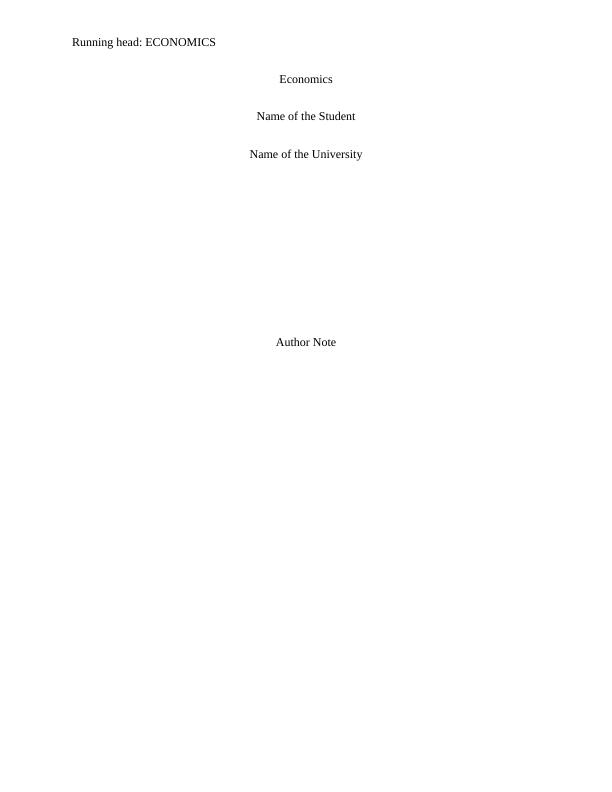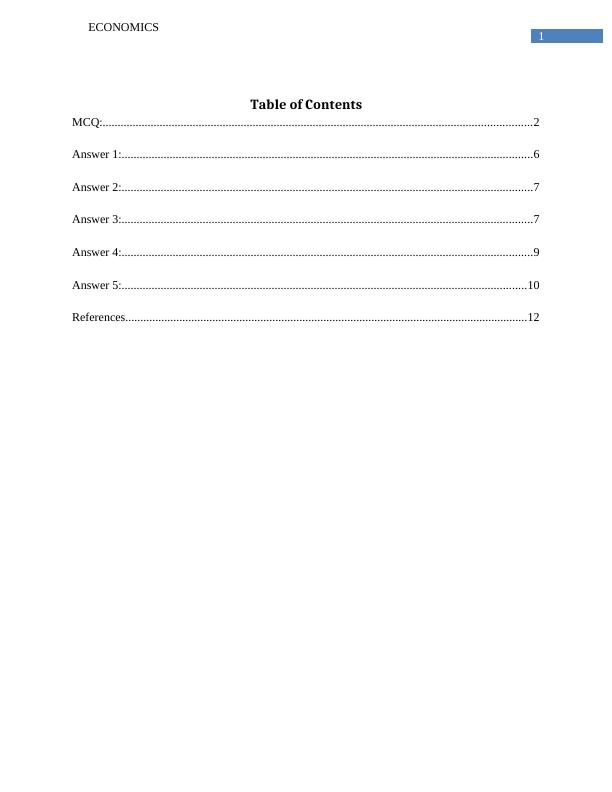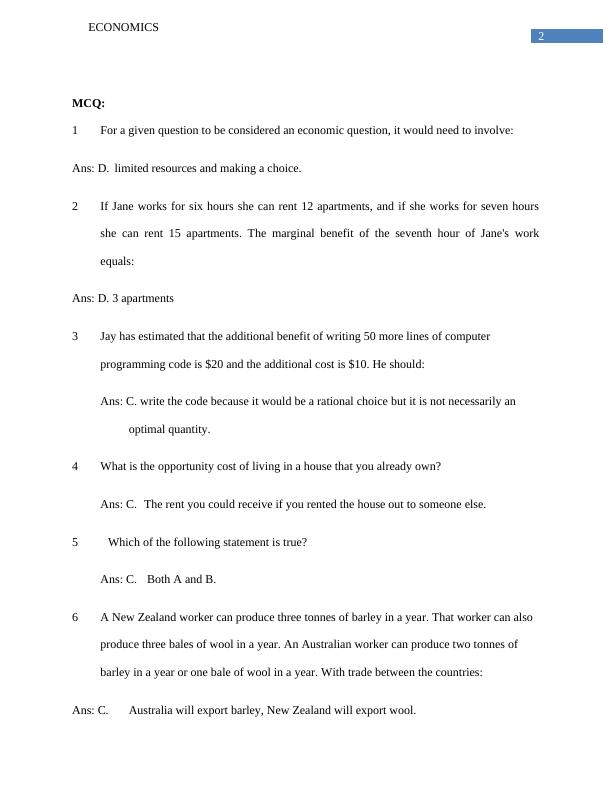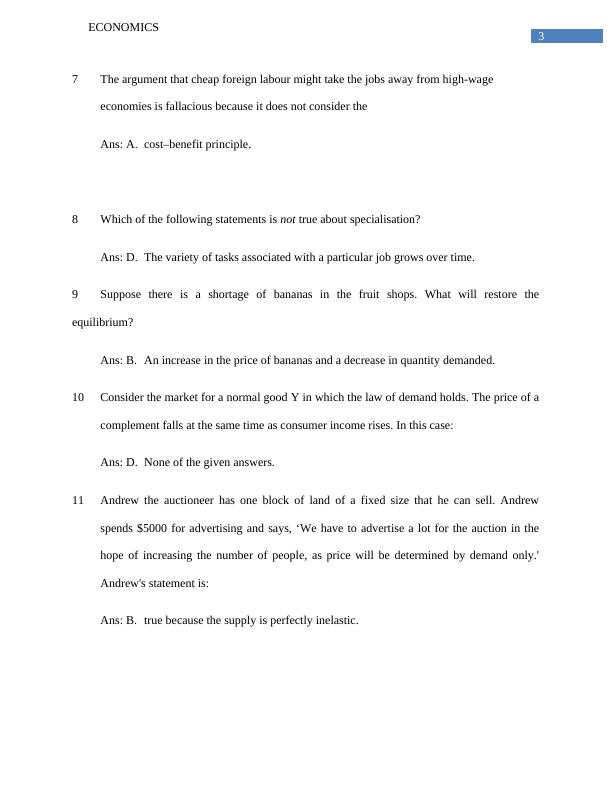Economics: MCQs, Price Elasticity, Monopoly, Oligopoly and More
Added on 2023-06-14
13 Pages1799 Words400 Views
Running head: ECONOMICS
Economics
Name of the Student
Name of the University
Author Note
Economics
Name of the Student
Name of the University
Author Note

1
ECONOMICS
Table of Contents
MCQ:...............................................................................................................................................2
Answer 1:.........................................................................................................................................6
Answer 2:.........................................................................................................................................7
Answer 3:.........................................................................................................................................7
Answer 4:.........................................................................................................................................9
Answer 5:.......................................................................................................................................10
References......................................................................................................................................12
ECONOMICS
Table of Contents
MCQ:...............................................................................................................................................2
Answer 1:.........................................................................................................................................6
Answer 2:.........................................................................................................................................7
Answer 3:.........................................................................................................................................7
Answer 4:.........................................................................................................................................9
Answer 5:.......................................................................................................................................10
References......................................................................................................................................12

2
ECONOMICS
MCQ:
1 For a given question to be considered an economic question, it would need to involve:
Ans: D. limited resources and making a choice.
2 If Jane works for six hours she can rent 12 apartments, and if she works for seven hours
she can rent 15 apartments. The marginal benefit of the seventh hour of Jane's work
equals:
Ans: D. 3 apartments
3 Jay has estimated that the additional benefit of writing 50 more lines of computer
programming code is $20 and the additional cost is $10. He should:
Ans: C. write the code because it would be a rational choice but it is not necessarily an
optimal quantity.
4 What is the opportunity cost of living in a house that you already own?
Ans: C. The rent you could receive if you rented the house out to someone else.
5 Which of the following statement is true?
Ans: C. Both A and B.
6 A New Zealand worker can produce three tonnes of barley in a year. That worker can also
produce three bales of wool in a year. An Australian worker can produce two tonnes of
barley in a year or one bale of wool in a year. With trade between the countries:
Ans: C. Australia will export barley, New Zealand will export wool.
ECONOMICS
MCQ:
1 For a given question to be considered an economic question, it would need to involve:
Ans: D. limited resources and making a choice.
2 If Jane works for six hours she can rent 12 apartments, and if she works for seven hours
she can rent 15 apartments. The marginal benefit of the seventh hour of Jane's work
equals:
Ans: D. 3 apartments
3 Jay has estimated that the additional benefit of writing 50 more lines of computer
programming code is $20 and the additional cost is $10. He should:
Ans: C. write the code because it would be a rational choice but it is not necessarily an
optimal quantity.
4 What is the opportunity cost of living in a house that you already own?
Ans: C. The rent you could receive if you rented the house out to someone else.
5 Which of the following statement is true?
Ans: C. Both A and B.
6 A New Zealand worker can produce three tonnes of barley in a year. That worker can also
produce three bales of wool in a year. An Australian worker can produce two tonnes of
barley in a year or one bale of wool in a year. With trade between the countries:
Ans: C. Australia will export barley, New Zealand will export wool.

3
ECONOMICS
7 The argument that cheap foreign labour might take the jobs away from high-wage
economies is fallacious because it does not consider the
Ans: A. cost–benefit principle.
8 Which of the following statements is not true about specialisation?
Ans: D. The variety of tasks associated with a particular job grows over time.
9 Suppose there is a shortage of bananas in the fruit shops. What will restore the
equilibrium?
Ans: B. An increase in the price of bananas and a decrease in quantity demanded.
10 Consider the market for a normal good Y in which the law of demand holds. The price of a
complement falls at the same time as consumer income rises. In this case:
Ans: D. None of the given answers.
11 Andrew the auctioneer has one block of land of a fixed size that he can sell. Andrew
spends $5000 for advertising and says, ‘We have to advertise a lot for the auction in the
hope of increasing the number of people, as price will be determined by demand only.'
Andrew's statement is:
Ans: B. true because the supply is perfectly inelastic.
ECONOMICS
7 The argument that cheap foreign labour might take the jobs away from high-wage
economies is fallacious because it does not consider the
Ans: A. cost–benefit principle.
8 Which of the following statements is not true about specialisation?
Ans: D. The variety of tasks associated with a particular job grows over time.
9 Suppose there is a shortage of bananas in the fruit shops. What will restore the
equilibrium?
Ans: B. An increase in the price of bananas and a decrease in quantity demanded.
10 Consider the market for a normal good Y in which the law of demand holds. The price of a
complement falls at the same time as consumer income rises. In this case:
Ans: D. None of the given answers.
11 Andrew the auctioneer has one block of land of a fixed size that he can sell. Andrew
spends $5000 for advertising and says, ‘We have to advertise a lot for the auction in the
hope of increasing the number of people, as price will be determined by demand only.'
Andrew's statement is:
Ans: B. true because the supply is perfectly inelastic.

End of preview
Want to access all the pages? Upload your documents or become a member.
Related Documents
Economics Answers - Assignmentlg...
|13
|1770
|319
